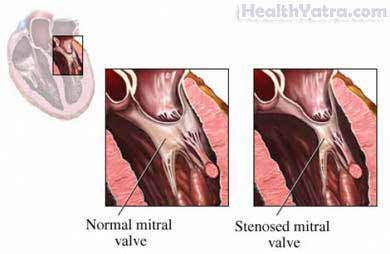সংজ্ঞা
Mitral stenosis is a narrowing of the mitral valve in the heart. This valve is located between the upper chamber and the lower pumping chamber of the left side of the heart. Blood must flow from the atrium, through the mitral valve, and into the ventricle before being pumped out into the rest of the body. Mitral stenosis results in poor blood flow between the two left chambers, so not enough blood and oxygen is pumped throughout the body.

কারণসমূহ
The most common cause of mitral stenosis is rheumatic fever, which scars the mitral valve. A less common cause is a congenital defect, usually part of a complex of multiple heart defects present at birth. Very rare causes include infectious endocarditis, blood clots, tumors, or other growths that block blood flow through the mitral valve.
ঝুঁকির কারণ
The main risk factor for mitral stenosis is rheumatic fever. Other factors that increase your risk of mitral valve stenosis include:
- লিঙ্গ: মহিলা
- Age: 30-50
লক্ষণ
উপসর্গ অন্তর্ভুক্ত হতে পারে:
- Difficulty breathing, especially during exercise and when lying flat
- Awakening short of breath in the middle of the night
- ক্লান্তি
- Chest pain, such as squeezing, pressure, or tightness—rare
- Sensation of rapid or irregular heartbeat
- Cough with exertion
- রক্ত কাশি
- Swelling of the legs or feet
- ঘন ঘন শ্বাসযন্ত্রের সংক্রমণ
- Lightheadedness, fainting
রোগ নির্ণয়
The doctor will ask about your symptoms and medical history. A physical exam will be done. The doctor may be alerted to mitral stenosis by the following:
- Abnormal chest sounds, such as a heart murmur or snap
- Stretching of a vein in the neck
- Signs of fluid in the lungs
Images may be taken of your chest. This can be done with:
- বুকের এক্স - রে
- ইকোকার্ডিওগ্রাম
- ট্রান্সসোফেজিয়াল ইকোকার্ডিওগ্রাম
- কার্ডিয়াক ক্যাথেটারাইজেশন
Your heart activity may need to be monitored. This can be done with:
- ইলেক্ট্রোকার্ডিওগ্রাম (ইসিজি, ইকেজি)
- হোল্টার মনিটর
চিকিৎসা
If you have mild mitral stenosis, your condition will need to be monitored, but may not need immediate treatment for symptoms associated with mitral stenosis. When symptoms become more severe, you may need to limit exertion and avoid high-salt foods. In addition, treatments may include:
ওষুধ
Drugs may be prescribed to treat specific symptoms associated with mitral stenosis. These medications include:
- Drugs that lower the heart rate and improve the heart’s function
- Water pills
- রক্ত পাতলা করার ওষুধ
- Drugs to control heart arrhythmias
You may also need to take antibiotics when you have certain infections. This will help prevent further damage to your heart.
সার্জারি
Common types of heart valve surgery include:
- Mitral valvulotomy—A surgical cut or enlargement is made in the stenotic mitral valve to relieve the obstruction.
- Balloon valvuloplasty —A balloon device is inserted into the blocked mitral valve to open or enlarge the valve. This may provide temporary relief of symptoms. However, the valve may become blocked again.
- Mitral valve replacement —This is the surgical replacement of a defective heart valve. This surgery is usually delayed until symptoms are severe or the patient can no longer be helped by other procedures.
If you are diagnosed with mitral stenosis, follow your doctor’s instructions .
প্রতিরোধ
Most cases of mitral stenosis can be avoided by preventing rheumatic fever:
- Treat strep throat infections promptly to avoid rheumatic fever, which can cause scarring of the heart valve. Always finish all of the antibiotics prescribed, even if you feel better before taking all of the doses.
- Avoid IV drug use
In addition, there are several things you can do to try to avoid some of the complications of mitral stenosis:
- Get regular medical care, including checkups and periodic electrocardiograms.
- Talk to your dentist and doctor about your condition before any medical or dental procedures. It is no longer recommended that you take antibiotics to prevent infections before procedures, but it may be necessary in some cases.
- If your valve problem was caused by rheumatic fever, talk to your doctor about antibiotic treatment to prevent future episodes of rheumatic fever.
- Avoid caffeine, alcohol, and drugs that speed up your heart rate. They will only worsen your symptoms.
- একটি স্বাস্থ্যকর ওজন বজায় রাখা.
- Follow your doctor’s recommendations for exercise.
- Ask your doctor about cutting back on salt. This may help decrease the pressure in your heart and improve your symptoms.
- Monitor your blood pressure and inform your healthcare provider if you seem to be developing high blood pressure, which can worsen your symptoms.
